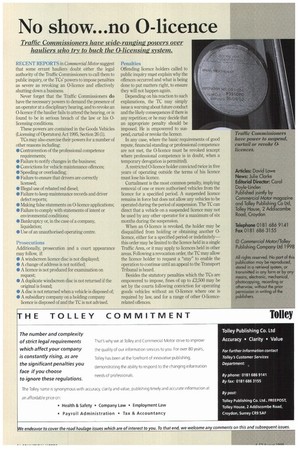No show...no 0-licence
Page 38

If you've noticed an error in this article please click here to report it so we can fix it.
Traffic Commissioners have wide-ranging powers over hauliers who try to buck the 0-licensing system.
RECENT REPORTS in Commercial Motor suggest that some errant hauliers doubt either the legal authority of the Traffic Commissioners to call them to public inquiry, or the TCs powers to impose penalties as severe as revoking an 0-licence and effectively shutting down a business.
Never forget that the Traffic Commissioners do have the necessary powers to demand the presence of an operator at a disciplinary hearing, and to revoke an 0-licence if the haulier fails to attend the hearing, or is found to be in serious breach of the law or his 0licensing conditions.
These powers are contained in the Goods Vehicles (Licensing of Operators) Act 1995, Section 26(1).
TCs may also exercise their powers for a number of other reasons including: • Contravention of the professional competence requirements; • Failure to notify changes in the business; • Convictions for vehicle maintenance offences; • Speeding or overloading; • Failure to ensure that drivers are correctly licensed; • Illegal use of rebated red diesel; • Failure to keep maintenance records and driver defect reports; • Making false statements on 0-licence applications; • Failure to comply with statements of intent or environmental conditions; • Bankruptcy or, in the case of a company, liquidation; • Use of an unauthorised operating centre.
Prosecutions Additionally, prosecution and a court appearance may follow, if: • A windscreen licence disc is not displayed; • A change of address is not notified; • A licence is not produced for examination on request; • A duplicate windscreen disc is not returned if the original is found; • A disc is not returned when a vehicle is disposed of; • A subsidiary company on a holding company licence is disposed of and the TC is not advised. Penalties Offending licence holders called to public inquiry must explain why the offences occurred and what is being done to put matters right, to ensure they will not happen again.
Depending on his reaction to such explanations, the TC may simply issue a warning about future conduct and the likely consequences if there is any repetition; or he may decide that an appropriate penalty should be imposed. He is empowered to suspend, curtail or revoke the licence.
In any case, where the basic requirements of good repute, financial standing or professional competence are not met, the 0-licence must be revoked (except where professional competence is in doubt, when a temporary derogation is permitted).
A restricted 0-licence holder convicted twice in five years of operating outside the terms of his licence must lose his licence.
Curtailment is the most common penalty, implying removal of one or more authorised vehicles from the licence for a specified period. A suspended licence remains in force but does not allow any vehicles to be operated during the period of suspension, The IC can direct that a vehicle on a suspended licence may not be used by any other operator for a maximum of six months during the suspension.
When an 0-licence is revoked, the holder may be disqualified from holding or obtaining another 0licence, either for a specified period or indefinitely— this order may be limited to the licence held in a single Traffic Area, or it may apply to licences held in other areas. Following a revocation order, the TC may allow the licence holder to request a "stay" to enable the operation to continue until an appeal to the Transport Tribunal is heard.
Besides the statutory penalties which the TCs are empowered to impose, fines of up to £2,500 may be set by the courts following conviction for operating goods vehicles without an 0-licence where one is required by law, and for a range of other 0-licencerelated offences.












































































































